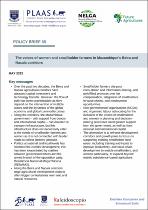| dc.contributor.author | Gonçalves, Euclides | |
| dc.contributor.author | Sulle, Emmanuel | |
| dc.date.accessioned | 2023-06-01T10:53:03Z | |
| dc.date.available | 2023-06-01T10:53:03Z | |
| dc.date.issued | 2023 | |
| dc.identifier.citation | Gonçalves, E. & Sulle, E. (2023). The voices of women and smallholder farmers in Mozambique’s Beira and Nacala corridors. UWC PLAAS. Policy brief 65 | en_US |
| dc.identifier.uri | http://hdl.handle.net/10566/8986 | |
| dc.description.abstract | Over the past two decades, the Beira
and Nacala agricultural corridors have attracted capital investment and technology transfer. However, the flow of both has been unpredictable as they depend on the intervention of multiple actors and the dynamics of the global economy and global commodity prices.
Along the corridors, the Mozambique government – with support from donors and international capital – has invested in transport infrastructure, but this infrastructure does not necessarily cater to the needs of smallholder farmers and women as it is not connected with feeder roads to collect farmers’ produce.
Politics at national and local levels has hindered the corridor development; this has been exacerbated by clashes between government forces and the armed branch of the opposition party, Resistência Nacional Moçambicana(RENAMO).
Along the Beira and Nacala corridors, large agricultural development projects often trigger contestations over land and natural resources | en_US |
| dc.language.iso | en | en_US |
| dc.publisher | UWC PLAAS | en_US |
| dc.subject | Capital investment | en_US |
| dc.subject | Global commodity prices | en_US |
| dc.subject | Nacala agricultural corridors | en_US |
| dc.subject | Mozambique government | en_US |
| dc.title | The voices of women and smallholder farmers in Mozambique’s Beira and Nacala corridors | en_US |
| dc.type | Article | en_US |

